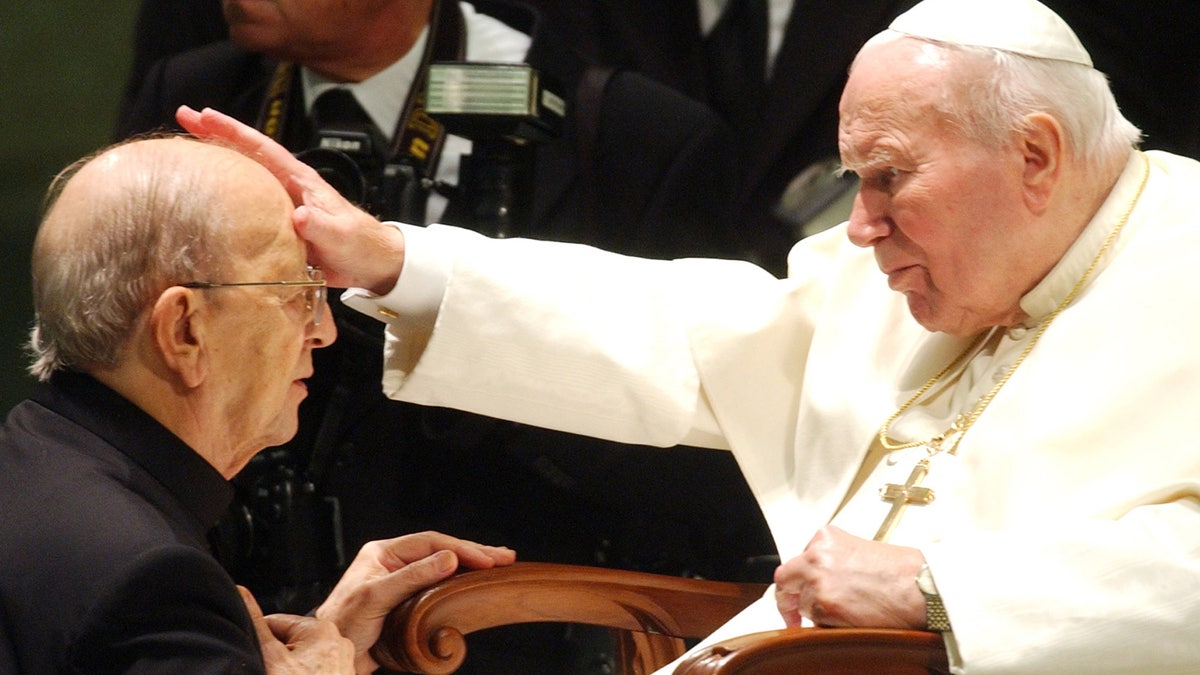
Pope John Paul II gives his blessing to late father Marcial Maciel on Nov. 30, 2004. (ap)
He was loved by millions – drawing huge crowds and commanding rock star admiration wherever he went.
But as much as he was adored, to the point that he will be canonized this Sunday, Pope John Paul II's legacy remains stained by sexual abuse scandals that festered under his watch.
Pope John Paul II and his top advisers, experts say, failed to grasp the severity of the problem until late in his 26-year papacy, especially concerns about the troubled Legion of Christ order and its leader, the Mexican-born Rev. Marcial Maciel.
Can we say the tree is bad then? Purely from a logical standpoint, I would say no. I absolve Father Maciel. I do not judge him.
According to a trove of 212 Vatican documents exposed in the 2012 book "The Will to Not Know" and placed online at www.lavoluntuddenosaber.com, the Legion's troubles were not news to the Vatican.
In Sept. 30, 1979, an analysis of the Rockville Center documents by the Congregation for Religious concludes that the alleged crimes by Rev. Maciel – drug abuse, sexual abuse and financial improprieties – occurred a long time ago and the case should be left alone "especially since the order is flourishing and maintains its discipline and fervor."
If the accusations are to be taken seriously, it continues, Maciel should be asked to respond. If he denies them, "let it go." If he confesses, he should be asked to resign voluntarily, the Congregation recommends.
John Paul’s papacy had begun a little over a year before, on October 16, 1978.
For decades, thanks to Maciel's ability to keep his own priests quiet and his foresight to place trusted Legion priests in key Vatican offices, Rome apparently looked the other way. Vatican officials were impressed instead by the orthodoxy of his priests and Maciel's ability to attract new vocations and donations.
John Paul, who in 1994 praised Maciel as an "efficacious guide to youth," wasn't alone in being duped. His top advisers were some of Maciel's fiercest supporters, convinced that the accusations against him were the typical "calumnies" hurled at the greatest of saints. They were swayed instead by numerous testimonies from bishops and others of his greatness — documentation which also features in the Vatican archives.
Some experts believe it wasn’t that John Paul was naïve – his experience in Poland under communist and Nazi rule, where innocent priests were often discredited by trumped-up accusations, is believed to have influenced his general defensiveness of the clergy.
Two years after the Vatican sentenced Maciel to a lifetime of penance and prayer for sexually abusing his seminarians, John Paul's No. 2, Cardinal Angelo Sodano, in 2008 was still praising the spirit of Maciel and his "humility" in stepping aside after the Vatican finally confronted him with the accusations.
John Paul's prefect of the Congregation for Religious, Cardinal Franc Rode, told Legion priests that same year he had absolved Maciel and praised the good "fruits" that Maciel's Legion had given the church.
"The fruit is good. The fruit is extraordinarily good. It is excellent," Rode said, according to his November 2008 speech made public online by Mexico's El Zocalo newspaper. "Can we say the tree is bad then? Purely from a logical standpoint, I would say no. I absolve Father Maciel. I do not judge him."
Maciel's fraud, one of the greatest scandals of the 20th-century Catholic Church, raises uncomfortable questions for today's Vatican about how so many people could have been fooled for so long. It also brings into question how the church's own structure, values and priorities enabled a cult-like order to grow from within and how far accountability for all the harm done should go.
Maciel died on January 30, 2008 in Jacksonville, Florida, at 87 year of age.
Based on reporting by The Associated Press.
Follow us on twitter.com/foxnewslatino
Like us at facebook.com/foxnewslatino
